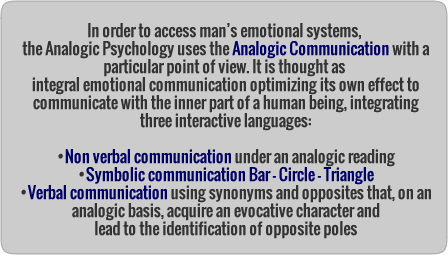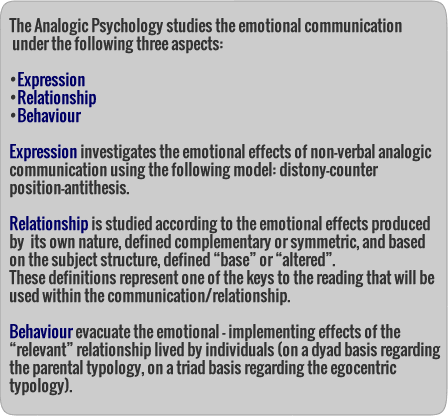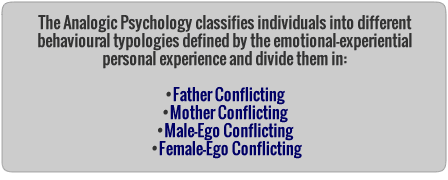ANALOGIC PSYCHOLOGY
The Analogic Psychology studies the laws which run the emotional dynamics of individuals together with its connected expressions.
Moreover it divides individuals into relevant categories called types, underlining the behavioural features.
The Analogic Psychology uses communication as stimulus-answers-reinforcement of verbal and non verbal type, transforming a simple informative communication into a more effective interactive communication (not only information exchange but also emotional “services”), in order to create the necessary analogic conditions to achieve consent, to improve the relationship, in whatever environment it may happen, and to solve problems and emotional or behavioural uneasiness.

The syntactic study of interactive languages allows Analogic Psychology to define and classify the most significant signs, gestures, words and behaviours expressed by the individual, defining the different possible interpretations.
The semantic study of interactive (or emotional) languages allows to discover the origin of analogies and of the most revealing evolutionary stages in individuals’ life, decoding all cognitive maps.

The study of laws and global behaviours within emotional (or interactive) communication allows to highlight how important different evolutionary stages are for individuals; communication itself will always be conditioned by “relevant relationships" lived in the early childhood/teenage within the native family (father and mother).

The Analogic Psychology, analysing a behavioural phenomenon, does not consider the possible correlations cause and effect according to the common schemes of formal logic, but the pre-organized analogies deriving from the irrational processes typical of the emotional thought.
The mechanism notoriously known as "compulsory repetition", leads individuals to live again past emotional events, identifying as fundamental ideas, things, people and relationships on the basis of duplication of these aspects in the present.
For each typological classification, Analogic Psychology defines laws and specific behavioural codes used by individuals in order to better interact with them, evaluating each dynamism deriving by their emotional needs.






